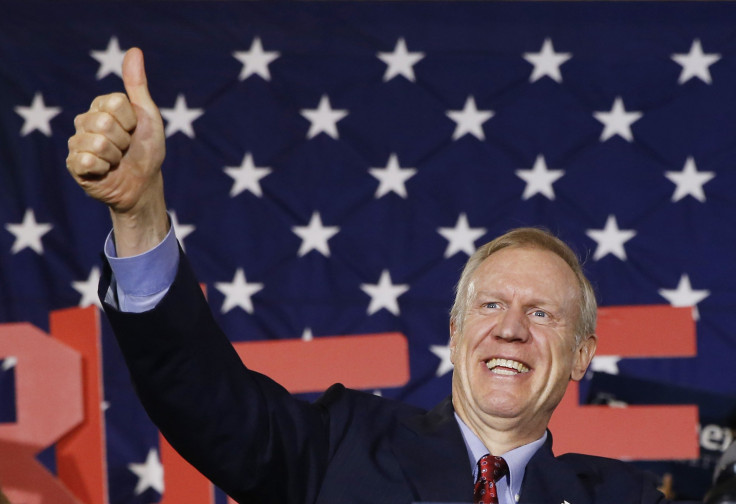Illinois Blocks Release Of Info About Which Firms Are Managing $3 Billion Of Public Money

Public pensions overseers may be managing public money -- the retirement savings for teachers, firefighters and other municipal employees -- but they are increasingly averse to making public exactly who is managing the cash and how much money they are paying out in fees to Wall Street. Here’s the latest example: Last week Illinois officials blocked the release of information about which financial firms are managing, and making fees off of, billions of dollars’ worth of taxpayer-funded pensions.
The secrecy surrounds a form of pooled investment known as a "fund of funds." It resembles a diversified mutual fund portfolio, except that instead of mutual fund managers moving investors' money into a variety of stocks, fund-of-fund managers move investors' money (in this case, pension money) into a variety of fee-charging hedge fund, private equity and venture capital firms.
As part of its ongoing investigation of the intersection between financial fees, campaign contributions and public pension systems, International Business Times requested a list of the financial firms receiving Illinois state pension money through fund-of-funds. The objective was to find out if fund-of-funds managers are making political donations to state officials -- a practice that a 2011 Securities and Exchange Commission (SEC) rule aims to prohibit. IBTimes requested the information from the Illinois State Board of Investment and the Illinois Teachers Retirement System, which collectively oversee more than $50 billion in assets.
In response, Illinois officials released the names of the firms managing the overall fund of funds. In all, state documents show those firms manage more than $3 billion of Illinois pension money. But state officials would not disclose the identities of the financial companies within the fund-of-funds that ultimately handle that money. That means the public -- including the retirees relying on the pension system -- cannot know who is managing hundreds of millions of taxpayer dollars and how much those firms are earning in fees from those accounts. The public also cannot tell if firms managing the pension money made prohibited political donations to state officials and candidates for state office.
An official at the Illinois State Board of Investment contended that the identities of the firms in the fund-of-funds "constitute trade secrets" (which state law exempts from being disclosed) and that releasing the names "would cause competitive harm" to the firms.
A spokesperson for the Illinois Teachers Retirement System similarly refused to identify the financial firms in the system’s fund-of-funds by asserting such information is “proprietary.” The spokesperson said Illinois public officials had signed confidentiality agreements promising to not disclose the information to the public. Such agreements, critics say, make it harder for pension systems to compare fee structures and secure the best investment deals for retirees.
Illinois’ Freedom of Information Act includes provisions permitting state officials to exempt some information about private equity firms from open records requests. But according to the law, the exemption “does not apply to the aggregate financial performance information of a private equity fund, nor to the identity of the fund's managers.”
When governments conceal the identities of firms in fund of funds, they create an environment that allows financial companies to evade -- or possibly break -- campaign finance laws, said former SEC attorney Ted Siedle.
"Fund-of-funds are the perfect pay-to-play daisy chains where dozens of managers can make political contributions to officials at the direction of the fund of fund manager in order to influence public pension investment decisions," Siedle told IBTimes. "Those contributions may be prohibited by SEC laws, but because the identities of the fund-of-fund managers are secret, the contributions and link to the pension investments are not easily traceable."
Illinois is not the only state with pension secrets. Rhode Island General Treasurer Gina Raimondo -- now the governor-elect -- rejected a newspaper's open records request for information about the state's hedge fund investments. "Fund managers keep this information confidential to help preserve the productivity of their staff and to minimize attention around their own compensation," her office said. Meanwhile, a private equity firm is threatening to bar Iowa from future investments if officials there comply with an open records request for information about fees the firm is earning from the state pension system.
While Illinois state pension officials are concealing the identities of managers in their fund of fund investments, three Chicago municipal pension systems did provide that information to IBTimes. The documents they released showed that the pension funds are investing in fund-of-funds that direct city money into investment vehicles run by a company whose executives are major donors to Chicago Mayor Rahm Emanuel.
The SEC rule prohibits firms from earning management fees from pensions if those firms' executives make political donations to public officials overseeing those pension systems. Emanuel and his administration appoint trustees to the boards of the Chicago city pension systems.
© Copyright IBTimes 2024. All rights reserved.





















